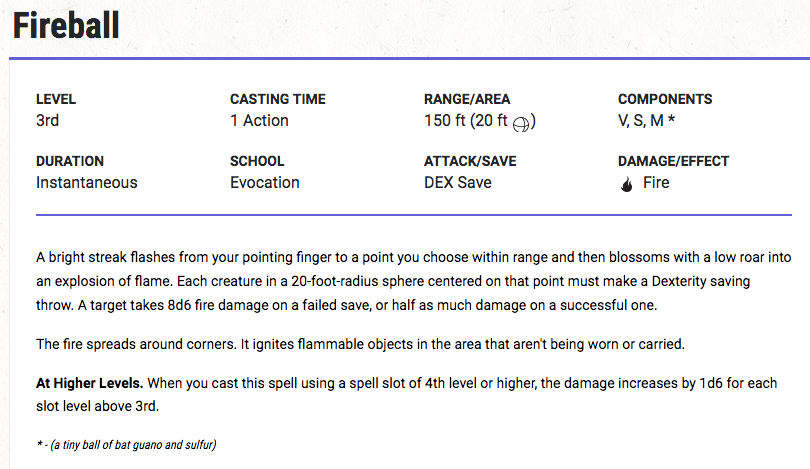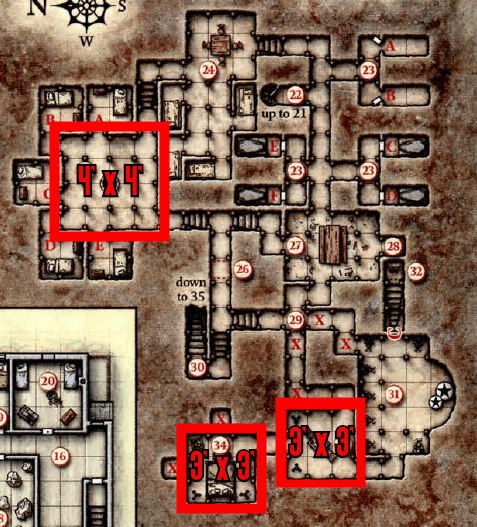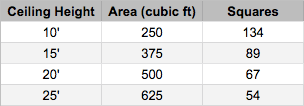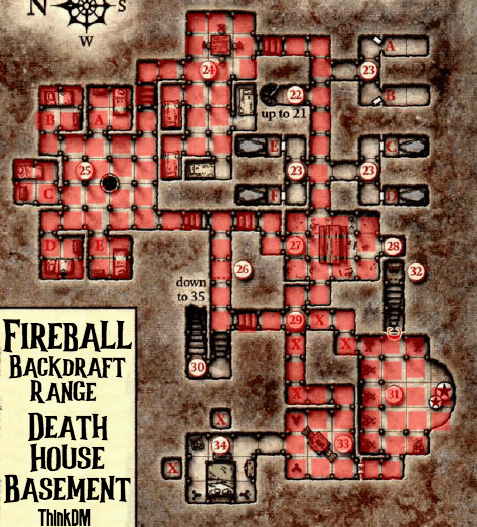All the way back in Original Dungeons & Dragons, the fireball (then two words) used to take up the full volume of a space. So, if you cast a fireball in a room to small to contain it, the blast would expand to other rooms.

For the curious, those two inches translate to 20 feet. This size persisted through time.
In 5th Edition, the fireball is a sphere of fire with a 20-foot radius:

That 20′ radius means fireball takes up 33,510 ft3 of space! However, that’s only in open space. In 5th Edition, a fireball expands around corners, but not beyond its 20′ radius. Sage Advice confirms:

But…what happens if we apply the “old school” backdraft rules in a dungeon?
We know that a fireball will fill a standard dungeon room. But how many?
Dungeon Rooms
Let’s assume a standard dungeon has 10-foot ceilings. This is probably high unless your campaign is set in modern times, but it’s a very sensible height to use with a 5-foot grid.

Rooms
The standard bedroom above is 3 x 3 squares. A 15′ x 15′ x 10′ room can only hold 2,250 ft3 of space. A fireball could fill almost fifteen of those rooms!
Let’s increase the room size a little, like the common area above. A 20′ x 20′ x 10′ room holds 4,000 ft3 of space. A fireball can fill more than eight of those rooms!
A 25′ x 25′ x 10′ room holds 6,250 ft3 of space. A fireball fills more than five of those.
We’re not likely to see rooms larger than that in a dungeon, unless it’s a great hall or something large enough to adjudicate the fireball on its own.
Hallways
What about hallways? Many (but not all) hallways are 10 feet wide. A fireball cast in a 10′ x 10′ hallway will fill 335 feet, which should be enough to cover any published dungeon. For perspective, that’s farther than a standard PC can sprint over 5 rounds (using the Dash action). Double that for a hallway half as wide.
But, there’s got to be a better way to do this than breaking this all out into tetris pieces.
Per Square
If we find out the cubic capacity of each square (5′ x 5′) on a battle mat (keeping the 10′ ceilings), we can just count out the number of spaces the fireball occupies. Each 5′ x 5′ x 10′ square is 250 ft3. That’s 134 squares.
Of course, this changes with the ceiling height. Here’s a handy chart:

That’s shockingly massive. If you run with fireball backdraft, it can very easily get out of hand. Let’s run it through a test case, so we can put it in perspective.
Death House
The House
Curse of Strahd’s Death House is about 64 spaces per floor. It’s a 6-by-11 square floorplan. We can drop a couple squares to account for the walls around the stairs. This means a fireball would blow out two entire floors of the Death House.
Of course, the real numbers here are a little more tricky. That’s because of the Death House’s unique architectural stylings. All the floors are a different height. The 3rd floor also has some balconies. The attic has even less floor space, and the image suggests a vaulted ceiling, but we’ll use the listed height.

Factoring in the ceiling height, here’s the area of the floors in the Death House:

Remember the fireball takes up 33,510 ft3. By the true numbers, you won’t exactly get the full first two floors. But, you will blow the windows out of any other combination of two consecutive floors. Be careful in there.
The Basement
Running down into the basement, we get a great visualization:

You may have noticed that the design theory in this week’s post runs contrary to the ThinkDM method for simplified area effect spell damage. We’re not beholden to any level of crunch. These techniques form two pieces of a puzzle. Don’t be afraid to mix and match to find the right blend of rules for your table.


I remember doing Fireballs the old way. It was really tricky doing them in dungeons, and often the magic user had to hold his fire (pun!), else threaten the whole party.
LikeLike
Reblogged this on DDOCentral.
LikeLike
I don’t know where I first heard this argument, but isn’t there consideration for the effects of the blast having to travel around corners? That is, shouldn’t the 90 degree turn have an impact on how much further the blast can go?
Personally, I’ve always seen fireball as akin to an explosive effect, like tossing a dozen sticks of dynamite into a group of goblins and watching bits and pieces fly everywhere.
Makes me think there’s got to be some good research on the effects of grenades and similar explosives . . .
LikeLike
I admit to not being a demolitions expert. I’d always welcome better information!
LikeLike
Found it.
Primary takeaway: fireball should not be compared to an explosion. There are several elements not present in the spell’s description; besides, if we go that route, at best we’d end up with an argument for a target taking damage while standing behind cover (due to overpressure).
LikeLike
I’ve always hated Death House. I can think of no better way to make it fun than to give the players a “modified” scroll of fireball and let them use it to try and solve this place like a puzzle. Incinerate as much as you can in one scroll, and maybe make it so that if you hit the maximum number of squares like in that chart they get some other benefit.
LikeLike